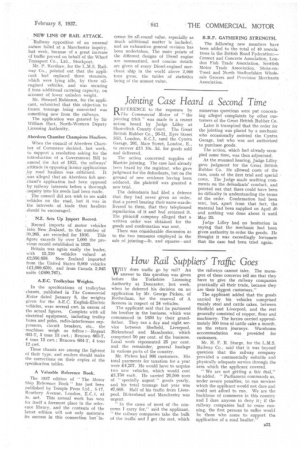How Rail Suppliers' Traffic Goes
Page 35

If you've noticed an error in this article please click here to report it so we can fix it.
WHY does traffic go by rail? An W answer to this question was given before the Yorkshire Licensing Authority at Doncaster, last week, when be deferred his decision on an application by Mr. George Picken, of Rotherham, for the renewal of A licences in respect of 24 vehicles.
The applicant said that he, partnered his brother in the business, which was commenced in 1850 by their grandfather. They ran a day and night service between Sheffield, Liverpool, Birkenhead and Manchester, which comprised 50 per cent, of the business. Local work represented 25 per cent. and the remainder, general haulage in various parts of the country.
Mr. Picken had 366 customers. His total payments for taxation for a year were £4,257. He would have to acquire two new vehicles, which would cost £1,750 each. He carried 26,500 tons of " specially urgent " goods yearly, and his total tonnage last year was 47,668. Half of his traffic from Liverpool, Birkenhead and Manchester was urgent.
" In the cases of most of the concerns I carry for," said the applicant, "the railway companies take the bulk of the traffic and I get the rest, which
the railways cannot take. The managers of these concerns tell me that they have to give the railway companies practically all their trade, because they are their biggest customers."
The applicant added that the goods carried by his vehicles comprised mainly steel and cattle cakes, between Sheffield and Liverpool, and the rest generally consisted of copper, flour and machinery. The lorries carried approximately 300 tons of cattle cake a month, on the return journeys. Warehouse accommodation was provided for customers.
Mr. H. F. R. Sturge, for the L.M.S. Railway Co., said that it was beyond question that the railway company provided a commercially suitable and physically adequate service through the area which the applicant covered.
" We are not getting afair deal," he added. " Parliament commands us. under severe penalties, to run services which the applicant would not dare and could not afford to run. We are the backbone of commerce in this country and I dare anyone to deny it; if the railway companies had to cease running, the first persons to suffer would be those who come to support the application of 'a road haulier."




























































































